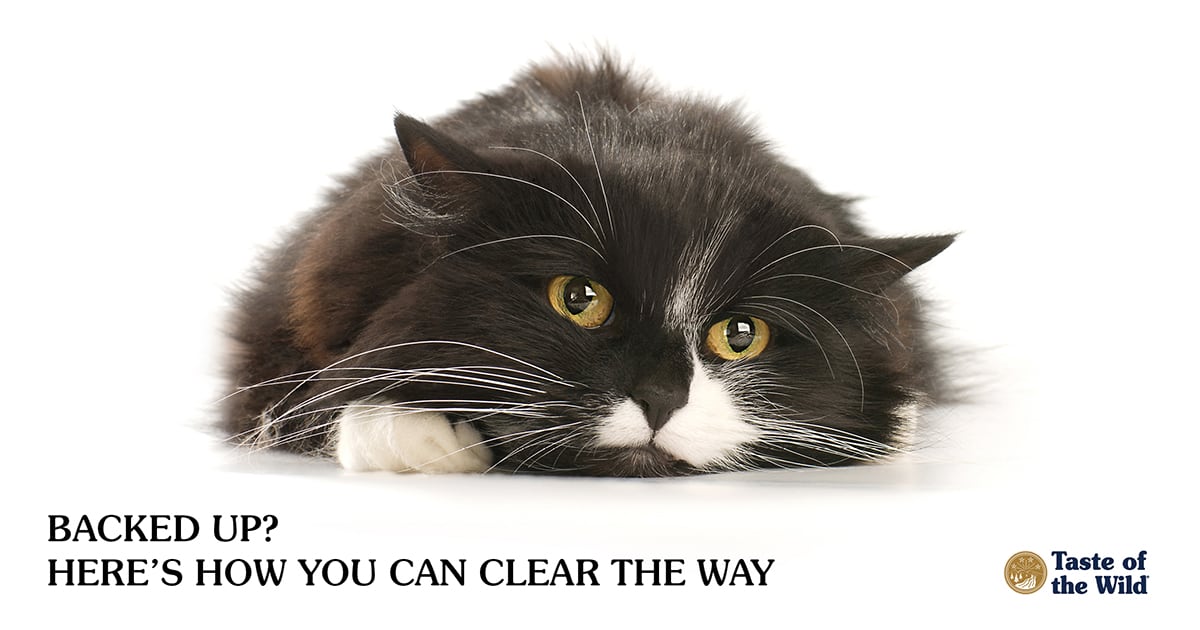
It’s fairly common for cats — especially older ones — to become constipated. They may strain in the litter box to no avail, or eschew the box entirely because it reminds them of the uncomfortable ordeal. So why is your cat backed up and what can you do about it?
What’s behind it? It could be anything
Stress is a factor. Some cats may stop defecating because their litter box isn’t to their liking. They may not like the litter scent or consistency. Or it’s just not tidied up often enough for them. Adding a new baby, pet or workmen to the household can also cause stress that — you guessed it — makes it hard for cats to do their business.
In older cats, diseases such as kidney failure can cause them to become dehydrated, which can lead to hard, dry stools that are difficult to pass. Cats with arthritis may have difficulty climbing up and down stairs to reach the litter box or have trouble squatting. Other causes include diets low in fiber, trauma (such as a fractured pelvis), certain drugs, gastrointestinal obstructions and even lack of exercise.

Signs of a problem
In general, healthy cats should defecate at least once a day. Cats that stop eating for any reason will obviously have less in their digestive tracts, so they may go less often. But if four to five days go by without evidence in the litter box, it’s time to be concerned.
In addition to straining in the litter box, constipated cats may often experience vomiting, loss of appetite and depression. That’s when it’s time to see your veterinarian.
How to remedy the situation
The treatment for your kitty will depend on the severity and the cause of the constipation. Obviously, if there’s an underlying health condition, such a gastrointestinal obstruction or fractures, those need to be addressed.
With mild cases of constipation, your veterinarian may recommend adding a small amount of plain canned pumpkin (not the spiced pie filling) to your kitty’s food every day for additional fiber and moisture. He or she may also recommend switching to a diet with more fiber.
Despite what you might hear online, do not give your cat mineral oil because it can cause vomiting and your cat may subsequently aspirate (inhale) the oil.
For cats that are dehydrated, providing subcutaneous fluids, encouraging drinking and/or switching to a canned diet that contains more water can help reduce the occurrence of hard, dry stools. Still other kitties may need laxatives, stool softeners or medications to improve intestinal motility. In severe cases, your veterinarian may recommend an enema to loosen up and remove the “logjam.”
It could actually get worse
Cats who are chronically constipated may develop megacolon, a serious condition in which the colon diameter becomes so distended that the tissue loses its ability to move contents along. In those cases, surgery may be needed to remove that segment of the digestive tract.
That’s why it’s a good idea to keep your eye on the litter box and seek veterinary help sooner rather than later.
RELATED POST: Top 8 Litter Box Training Issues & What to Do About Them
The information in this blog has been developed with our veterinarian and is designed to help educate pet parents. If you have questions or concerns about your pet's health or nutrition, please talk with your veterinarian.
